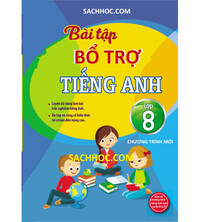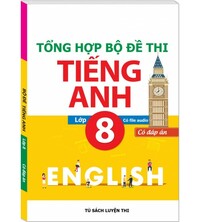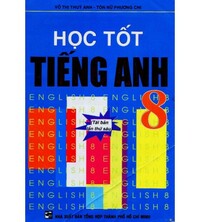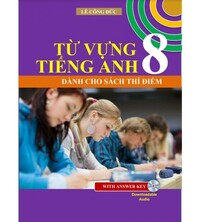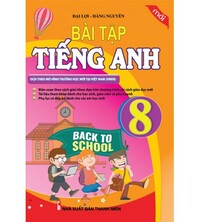Vocabulary & Grammar - Unit 6. Lifestyles - SBT Tiếng Anh 8 Global Success
1. Mark the letter A, B, C, or D to indicate the word that does NOT belong in each line. 2. Complete each of the sentences with a word or phrase from the box. 3. Complete each of the following sentences, using a word or phrase.4. Use the correct forms of the verbs in brackets to complete the passage. 5. Match each beginning 1 - 5 with a suitable ending A - E. Then choose IF or UNLESS to write the sentences.
Bài 1
1. Mark the letter A, B, C, or D to indicate the word that does NOT belong in each line.
(Đánh dấu chữ cái A, B, C hoặc D để chỉ ra từ KHÔNG thuộc về mỗi dòng.)
1.
A. unless
B. if
C. though
D. harmless
2.
A. concentrate
B. serve
C. interaction
D. maintain
3.
A. lifestyle
B. lively
C. difference
D. behaviour
4.
A. greeting
B. online
C. healthy
D. cultural
5.
A. hurry
B. nomadic
C. sociable
D. tribal
Lời giải chi tiết:

1. D
Giải thích: Đáp án D không phải là một từ nối.
2. C
Giải thích: Đáp án C không phải là một động từ.
3. B
Giải thích: Đáp án B không phải là một danh từ.
4. A
Giải thích: Đáp án A không phải là một tính từ.
5. A
Giải thích: Đáp án A không phải là một tính từ.
Bài 2
2. Complete each of the sentences with a word or phrase from the box.
(Hoàn thành mỗi câu với một từ hoặc cụm từ trong hộp.)

1. Knowing some local _____ will make it easier to travel in some countries.
2. When abroad, watch and see what other people are doing, and try to match their _____ if you can.
3. Americans won't understand you unless you _____ your pronunciation more.
4. Maintaining a _____ and learning good habits have a lot of benefits.
5. Doctors say that good _____ can help you reduce your risk of a heart attack and other illnesses.
6. Online lessons connect students and teachers through a live video platform, where they have _____ lessons.
Lời giải chi tiết:

1. Knowing some local cultural differences will make it easier to travel in some countries.
(Biết được một số khác biệt về văn hóa địa phương sẽ giúp bạn đi du lịch dễ dàng hơn ở một số quốc gia.)
2. When abroad, watch and see what other people are doing, and try to match their behaviour if you can.
(Khi ở nước ngoài, hãy quan sát xem người khác đang làm gì và cố gắng bắt chước hành vi của họ nếu bạn có thể.)
3. Americans won't understand you unless you practise your pronunciation more.
(Người Mỹ sẽ không hiểu bạn trừ khi bạn luyện phát âm nhiều hơn.)
4. Maintaining a healthy lifestyle and learning good habits have a lot of benefits.
(Duy trì lối sống lành mạnh và học những thói quen tốt có rất nhiều lợi ích.)
5. Doctors say that good lifestyle habits can help you reduce your risk of a heart attack and other illnesses.
(Các bác sĩ nói rằng thói quen sinh hoạt tốt có thể giúp bạn giảm nguy cơ bị đau tim và các bệnh khác.)
6. Online lessons connect students and teachers through a live video platform, where they have interactive lessons.
(Các bài học trực tuyến kết nối học sinh và giáo viên thông qua nền tảng video trực tiếp, nơi họ có các tiết học tương tác.)
Bài 3
3. Complete each of the following sentences, using a word or phrase.
(Hoàn thành mỗi câu sau đây, sử dụng một từ hoặc cụm từ.)
1. Modern technology enables more and more people to _____ from home.
2. When he saw me from a distance, he waved his hand to _____ me.
3. We are _____, so you won't have time to make some tea before we go.
4. If we don't save electricity, there _____ be power cuts.
5. She won't go to school _____ she feels better tomorrow.
6. La Tomatina is a festival in Spain that is all about _____.
Lời giải chi tiết:

1. Modern technology enables more and more people to work/ study from home.
(Công nghệ hiện đại cho phép ngày càng nhiều người làm việc/học tập tại nhà.)
2. When he saw me from a distance, he waved his hand to greet me.
(Khi nhìn thấy tôi từ xa, anh ấy vẫy tay chào tôi.)
3. We are in a hurry/ late, so you won't have time to make some tea before we go.
(Chúng tôi đang vội/ trễ, vì vậy bạn sẽ không có thời gian để pha trà trước khi chúng tôi đi.)
4. If we don't save electricity, there will be power cuts.
(Nếu chúng ta không tiết kiệm điện, sẽ bị cắt điện.)
5. She won't go to school unless she feels better tomorrow.
(Cô ấy sẽ không đến trường trừ khi cô ấy cảm thấy tốt hơn vào ngày mai.)
6. La Tomatina is a festival in Spain that is all about throwing tomatoes.
(La Tomatina là lễ hội ném cà chua ở Tây Ban Nha.)
Bài 4
4. Use the correct forms of the verbs in brackets to complete the passage.
(Sử dụng dạng đúng của động từ trong ngoặc để hoàn thành đoạn văn.)
The students in grade 5 will have their school picnic tomorrow. They need to be at the school playground by 8:00 a.m. to go to Heritage Village. The bus (1. arrive) _______ at 8:30 a.m. They are expected (2. reach) _______ Heritage Village at around 10:00 a.m. On arrival, students (3. go) ________ around to see the various exhibits. Then they (4. play) _______ in the park unless it (5. rain) ______ heavily. Around 12:00 p.m., all students (6. assemble) _______ for lunch. After having a short rest, they (7. sit) ________ in a circle, singing songs and playing games. At around 4:00 p.m., students (8. get on) ________ the bus and go home. We all hope they (9. have) _______ a fun day.
Lời giải chi tiết:

Đoạn văn hoàn chỉnh:
The students in grade 5 will have their school picnic tomorrow. They need to be at the school playground by 8:00 a.m. to go to Heritage Village. The bus (1) will arrive / arrives at 8:30 a.m. They are expected (2) to reach Heritage Village at around 10:00 a.m. On arrival, students (3) will go around to see the various exhibits. Then they (4) will play in the park unless it (5) rains heavily. Around 12:00 p.m., all students (6) will assemble for lunch. After having a short rest, they (7) will sit in a circle, singing songs and playing games. At around 4:00 p.m., students (8) will get on the bus and go home. We all hope they (9) will have a fun day.
Tạm dịch:
Các học sinh lớp 5 sẽ có chuyến dã ngoại của trường vào ngày mai. Các em cần có mặt ở sân chơi của trường trước 8 giờ sáng để đến Làng Di sản. Xe buýt sẽ đến lúc 8:30 sáng. Họ dự kiến sẽ đến Làng Di sản vào khoảng 10:00 sáng. Khi đến nơi, học sinh sẽ đi xung quanh để xem các cuộc triển lãm khác nhau. Sau đó, họ sẽ chơi trong công viên trừ khi trời mưa to. Khoảng 12 giờ trưa, tất cả học sinh tập trung ăn trưa. Sau khi nghỉ ngơi ngắn, họ sẽ ngồi thành vòng tròn, hát các bài hát và chơi trò chơi. Khoảng 16h học sinh sẽ lên xe buýt về nhà. Chúng tôi đều hy vọng họ sẽ có một ngày vui vẻ.
Bài 5
5. Match each beginning 1 - 5 with a suitable ending A - E. Then choose IF or UNLESS to write the sentences.
(Nối mỗi phần đầu 1 - 5 với phần kết thúc phù hợp A - E. Sau đó chọn IF hoặc UNLESS để viết câu.)
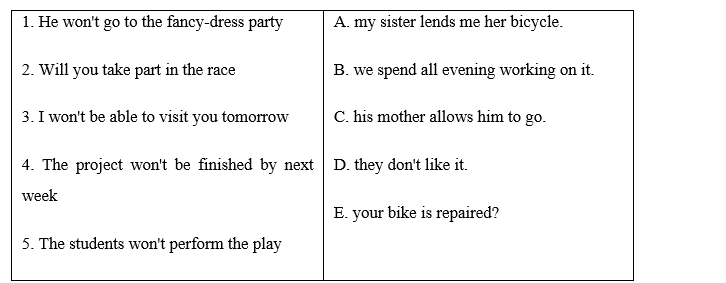
Lời giải chi tiết:

1. He won't go to the fancy-dress party unless his mother allows him to go.
(Anh ấy sẽ không đến bữa tiệc ăn mặc sang trọng nếu mẹ anh ấy cho phép anh ấy đi.)
2. Will you take part in the race if your bike is repaired?
(Bạn sẽ tham gia cuộc đua nếu chiếc xe đạp của bạn được sửa chứ?)
3. I won't be able to visit you tomorrow unless my sister lends me her bicycle.
(Ngày mai tôi không thể đến thăm bạn nếu chị gái tôi cho tôi mượn xe đạp của chị ấy.)
4. The project won't be finished by next week unless we spend all evening working on it.
(Dự án sẽ không hoàn thành vào tuần tớ nếu chúng tôi không dành cả buổi tối để làm nó.)
5. The students won't perform the play if they don't like it.
(Học sinh sẽ không biểu diễn vở kịch nếu họ không thích.)
Bài 6
6. Choose the correct answer A, B, C, or D to complete each sentence.
(Chọn đáp án đúng A, B, C hoặc D để hoàn thành mỗi câu.)
1. Technology has improved our lifestyles and has provided us with opportunities to enjoy more ______ time.
A. freedom
B. leisure
C. vacation
D. hobby
2. There are different types of street food among regions and ______ around the world.
A. cultures
B. traditions
C. customs
D. habits
3. The increase in obesity is a result of poor diet and a(n) ______ lifestyle.
A. health
B. healthy
C. unhealthy
D. active
4. How did people in the past ______ their food when there were no refrigerators?
A. have
B. make
C. keep
D. cook
5. ______ a healthier lifestyle means lowering your risk of developing many illnesses.
A. Living
B. Making
C. Getting
D. Letting
6. It is considered ______ to turn up for dinner on time in Tanzania: vou should be 15 minutes late.
A. polite
B. modern
C. suitable
D. rude
7. If you stay awake all night, you ______ very tired tomorrow.
A. are
B. were
C. will be
D. would be
8. With ______ technology, we will be able to have smaller and smaller computers.
A. traditional
B. native
C. social
D. modern
9. ______ something unexpected happens, we will have our exams in late May.
A. Therefore
B. Although
C. Because
D. Unless
10. “Can we try the street food in Ho Chi Minh City?” – “______”
A. Thank you.
B. Certainly.
C. Why so?
D. Can we?
Lời giải chi tiết:

1. B
Technology has improved our lifestyles and has provided us with opportunities to enjoy more leisure time.
(Công nghệ đã cải thiện lối sống của chúng ta và mang đến cho chúng ta cơ hội tận hưởng nhiều thời gian rảnh rỗi hơn.)
Giải thích:
A. freedom (n): tự do
B. leisure (n): nhàn rỗi
C. vacation (n): kỳ nghỉ
D. hobby (n): sở thích
2. A
There are different types of street food among regions and cultures around the world.
(Có nhiều loại thức ăn đường phố khác nhau giữa các vùng và nền văn hóa trên toàn thế giới.)
Giải thích:
A. cultures (n): nền văn hóa
B. traditions (n): truyền thống
C. customs (n): phong tục
D. habits (n): thói quen
3. C
The increase in obesity is a result of poor diet and a(n) unhealthy lifestyle.
(Sự gia tăng béo phì là kết quả của chế độ ăn uống kém và lối sống không lành mạnh)
Giải thích:
A. health (n): sức khỏe
B. healthy (adj): lành mạnh
C. unhealthy (n): không lành mạnh
D. active (n): hoạt động
4. C
How did people in the past keep their food when there were no refrigerators?
(Ngày xưa người ta giữ thực phẩm như thế nào khi không có tủ lạnh?)
Giải thích:
A. have (v): có
B. make (v): làm
C. keep (v): giữ
D. cook (n): nấu ăn
5. A
Living a healthier lifestyle means lowering your risk of developing many illnesses.
(Sống một lối sống lành mạnh hơn có nghĩa là giảm nguy cơ mắc nhiều bệnh tật.)
Giải thích:
A. Living (v): sống
B. Making (v): làm
C. Getting (v); bắt
D. Letting (v): cho thuê
6. D
It is considered rude to turn up for dinner on time in Tanzania: vou should be 15 minutes late.
(Việc đến ăn tối đúng giờ ở Tanzania được coi là thô lỗ: bạn nên đến muộn 15 phút.)
Giải thích:
A. polite (adj): lịch sự
B. modern (adj): hiện đại
C. suitable (adj): thích hợp
D. rude (adj): thô lỗ
7. C
If you stay awake all night, you will be very tired tomorrow.
(Nếu bạn thức cả đêm, bạn sẽ rất mệt mỏi vào ngày mai.)
Giải thích: Cấu trúc câu điều kiện loại 1: If + S + V(s/es), S + will/can/shall + V(nguyên mẫu)
8. D
With modern technology, we will be able to have smaller and smaller computers.
(Với công nghệ hiện đại, chúng ta sẽ có thể có những chiếc máy tính ngày càng nhỏ hơn.)
Giải thích
A. traditional (adj): truyền thống
B. native (adj): bản địa
C. social (adj): xã hội
D. modern (adj): hiện đại
9. D
Unless something unexpected happens, we will have our exams in late May.
(Trừ khi có điều gì đó bất ngờ xảy ra, chúng ta sẽ có kỳ thi vào cuối tháng 5.)
Giải thích:
A. Therefore: Vì vậy
B. Although: Mặc dù
C. Because: Bởi vì
D. Unless: Trừ khi
10. B
“Can we try the street food in Ho Chi Minh City?” – “Certainly.”
(“Chúng ta có thể thử món ăn đường phố ở Thành phố Hồ Chí Minh không?” – “Chắc chắn rồi”.)
Giải thích:
A. Thank you. (Cảm ơn bạn.)
B. Certainly. (Chắc chắn rồi.)
C. Why so? (Tại sao vậy?)
D. Can we? (Chúng ta có thể không?)
Search google: "từ khóa + timdapan.com" Ví dụ: "Vocabulary & Grammar - Unit 6. Lifestyles - SBT Tiếng Anh 8 Global Success timdapan.com"
